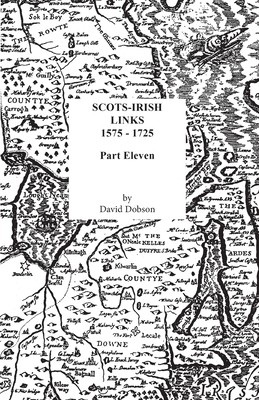
- We will send in 10–14 business days.
- Author: David Dobson
- Publisher: Clearfield
- ISBN-10: 0806359196
- ISBN-13: 9780806359199
- Format: 14 x 21.6 x 0.7 cm, minkšti viršeliai
- Language: English
- SAVE -10% with code: EXTRA
Reviews
Description
During the 17th century, as many as 100,000 Scottish Lowlanders relocated to the Plantation of Ulster (Northern Ireland). While the majority of settlers were from the Scottish Lowlands, some, especially in the late 16th century, were Highlanders. It should also be noted that although the Presbyterians were in the majority, a sizable minority were Episcopalians, and a few were Roman Catholic. Also, though the main area of settlement was in Ulster, it is evident that a number of Scots settled further south. Part Eleven of Scots Irish Links, 1575-1725 attempts to identify more of these Scottish settlers.Ã It is based on research carried out into both manuscript and published sources found in Scotland, Ireland, and England. This volume is heavily based on documents in the Public Record Office of Northern Ireland and the National Records of Scotland, especially those that establish the economic links of the period, such as the contemporary port books of both Scotland and Ireland, and records from the High Court of the Admiralty of Scotland.Ã Such records identify the ports and trading links that facilitated immigration to Ireland.Ã Within a few generations, the descendants of these Ulster Scots emigrated in substantial numbers across the Atlantic where, as the Scotch-Irish, they made a major contribution to the settlement and development of Colonial America.
EXTRA 10 % discount with code: EXTRA
The promotion ends in 21d.10:17:02
The discount code is valid when purchasing from 10 €. Discounts do not stack.
- Author: David Dobson
- Publisher: Clearfield
- ISBN-10: 0806359196
- ISBN-13: 9780806359199
- Format: 14 x 21.6 x 0.7 cm, minkšti viršeliai
- Language: English English
During the 17th century, as many as 100,000 Scottish Lowlanders relocated to the Plantation of Ulster (Northern Ireland). While the majority of settlers were from the Scottish Lowlands, some, especially in the late 16th century, were Highlanders. It should also be noted that although the Presbyterians were in the majority, a sizable minority were Episcopalians, and a few were Roman Catholic. Also, though the main area of settlement was in Ulster, it is evident that a number of Scots settled further south. Part Eleven of Scots Irish Links, 1575-1725 attempts to identify more of these Scottish settlers.Ã It is based on research carried out into both manuscript and published sources found in Scotland, Ireland, and England. This volume is heavily based on documents in the Public Record Office of Northern Ireland and the National Records of Scotland, especially those that establish the economic links of the period, such as the contemporary port books of both Scotland and Ireland, and records from the High Court of the Admiralty of Scotland.Ã Such records identify the ports and trading links that facilitated immigration to Ireland.Ã Within a few generations, the descendants of these Ulster Scots emigrated in substantial numbers across the Atlantic where, as the Scotch-Irish, they made a major contribution to the settlement and development of Colonial America.


Reviews